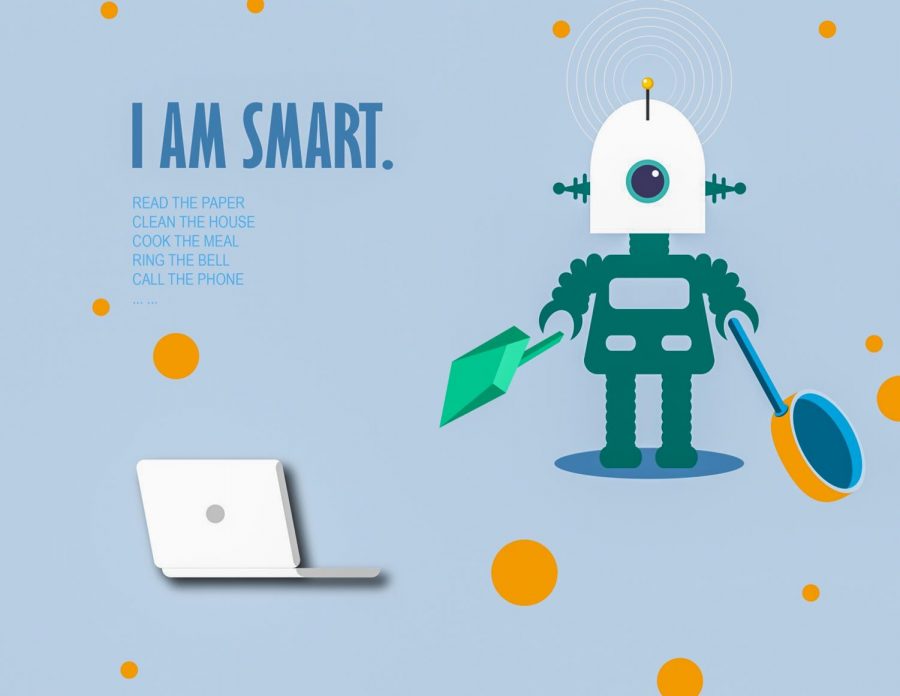Pullman should use AI for care services
While Artificial Intelligence can be scary, the benefits far outweigh the unknown risks involved, especially in the retirement-living industry in Pullman
FEIRAN ZOU | DAILY EVERGREEN ILLUSTRATION
AI can be used for a variety of jobs, but in Pullman they could be used for senior care services
January 27, 2020
Out here on the Palouse, we do not get the grand reserve of the incredible urban technological advancements that are flooding large scale cities. One look at Tokyo and you may feel like you are in a future dystopian young adult novel. Other cities may have multi-million-dollar light rails for public transportation.
We all know walking up the hills of campus isn’t ideal; cougar calves aren’t something that we all are enthusiastic about. With recent advancements in artificial intelligence used for self-driving cars, it is a very real possibility that utilization of such cars in Pullman could not only save your legs from walking from Southside to the UREC, but it could help make our campus more accessible for disabled students.
This doesn’t mean that self-driving cars in Pullman are a straight shot solution to our problems. In 2018 a pedestrian crossing the road in Tempe, Arizona was killed in a self-driving car accident because the car couldn’t detect a pedestrian crossing the road. Students frequently cross the roads almost as if they want to be hit. Before we could even think about bringing this to our lovely little town, the cars must be able to detect random students bolting out from seemingly nowhere and be able to accurately and effectively stop without causing any injuries on either end.
“Gradually introduced and properly regulated, AI has huge potential benefits to all aspects of society,” Lawrence Holder, computer science professor, said.
AI in Pullman is a double-edged sword. On one end, our campus becomes more accessible for disabled students, allowing transportation across campus without the hassle of setting up arrangements with administration. On the other end, the safety of pedestrians in town comes into question.
“I think the fear of AI is more a fear of how humans will use it rather than the technology itself,” Holder said.
While we may not get voice automated hover cars driving you to your digital art class by next year, Pullman will be much more accessible and high-tech when you come back in 20 years with the proper introduction of self-driving cars.
Contrary to popular belief, WSU isn’t the only thing in Pullman. Bishop Place Senior Living and the elders of Pullman could seriously benefit from an increase in artificial intelligence usage. From biometric tracking units hooked to a central monitor, to an amazon echo in every room to allow residents to choose their preferred temperature, AI is a necessity to these facilities. Especially since most, if not all residents require 24/7 care and watching.
Megan, an employee at Bishop Place Senior Living, said that they do not use any sort of AI devices in their facility.
The use of artificial intelligence in assisted living facilities can provide more care for those residents nearing the twilight years of their life.
The families of these residents tend to have respect that these employees attack each day here with a smile and positive attitude. Utilization of AI in senior care homes would not only help the residents, but it would take some of the weight off the employees’ backs as well.
In the end, using more AI would be a beautiful, helpful addition to the Pullman community, embrace it with open arms, but also be aware that these changes are a long way out. Until then, keep climbing up those hills and volunteering at your nearest senior living facility.


















Katie's grandma Karen Ross • Jan 29, 2020 at 9:49 am
I also attended a University that had hills and got a good workout walking to classes. So, yes, walking is an excellent way to maintain and increase health. But there are people with physical disabilities for whom it is impossible to walk and to get around.AI sounds like a wonderful way to help these people. And I really like the points in your article about Care facilities where individuals would be able to change the temperature in their room or change the channel on their television just with the help of AI.
Cynthia Freyer • Jan 27, 2020 at 11:20 am
Go listen to the words of a Harvard Medical School scientist, the genetist David Sinclair, on YouTube, where he details his research on how you can cause your body to remain youthfully healthy — and then edit your copy on the travails of hill walking. Please do not encourage aging by encouraging ease. We can reduce medical expenses by staying atop the science of the causes of aging.